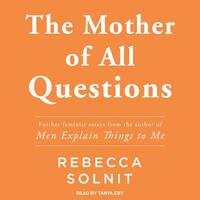You need to sign in or sign up before continuing.
Take a photo of a barcode or cover
was tossing up between 3 and 4 because i'm not sure how much, despite it being so wonderfully written, this was going to stay with me, but that last essay, on giant, is so lovely. kind of a salve for how difficult the facts of the rest of the book are to take in, again.
This book is centered around the topic of rape culture & violence, yet the essays range from ones on 1950s movies to ones on contemporary comedians. Solnit, I believe, does a much better job in this book connecting the main theme (the "mother of all questions") to all of her essays than her previous book, Men Explain Things to Me. I especially loved the chapter(s) on language as a tool of activism and radical change.
I found it a little too wordy at times so it wasn't necessarily a quick read but there was a lot of good, important information.
3.5 stars
I enjoyed this just a little more than Men Explain Things to Me. I even thought Solnit had grown more flexible in her views, particularly relating to non-white, non-American women— although I could still sense some hint of white feminism here and there.
It’s a thought-provoking book regardless. I especially love her take on Silence
I enjoyed this just a little more than Men Explain Things to Me. I even thought Solnit had grown more flexible in her views, particularly relating to non-white, non-American women— although I could still sense some hint of white feminism here and there.
It’s a thought-provoking book regardless. I especially love her take on Silence
I appreciate how Solnit writes about writing and stories and geography. However, her work is hindered by how she is seemingly unable to reflect on her identity in meaningful ways. For example, Solnit spends one essay talking about gay men as though she is a gay man--she is not. Solnit is a cis het woman, and how she talks about the LGBTQ+ communities does not sit well with me. I would appreciate if she could have reflected more on her presence in that community as a cishet woman than what she does here.
Four because of a heap of repetition. I still loved this book. Interesting seeing the outdated references to Louis CK being a great example of a feminist comedian.
informative
reflective
medium-paced
Using for notes as I listen:
I love the idea of tend and befriend. I am curious whether her supposition that we must be heard to be alive comes from her background as a writer. I feel like facebook lets us all be heard, to the detriment of humanity.
My difficulty with Solnit is she makes me hate people. Thinking of every undergraduate class as being full of unprosecuted rapists ( and why focus on universities? Because in this sacred educational space it is worse than for those in the workforce? Should students know better?) does not help me deepen my connection to humans. It seems like unhelpful gossip rather than a way forward.
I love the idea of tend and befriend. I am curious whether her supposition that we must be heard to be alive comes from her background as a writer. I feel like facebook lets us all be heard, to the detriment of humanity.
My difficulty with Solnit is she makes me hate people. Thinking of every undergraduate class as being full of unprosecuted rapists ( and why focus on universities? Because in this sacred educational space it is worse than for those in the workforce? Should students know better?) does not help me deepen my connection to humans. It seems like unhelpful gossip rather than a way forward.
Another great collection of essays by Rebecca Solnit. I’m only giving this 3 stars because I didn’t feel like I learned anything particularly *new* and I wanted the title essay to be the bulk of the book/theme. It was a very short essay at the beginning, which I found disappointing. Still, some good insight into relevant (feminist) issues with humor intertwined.
ebook ARC from Edelweiss - expected publication date March 2017.


